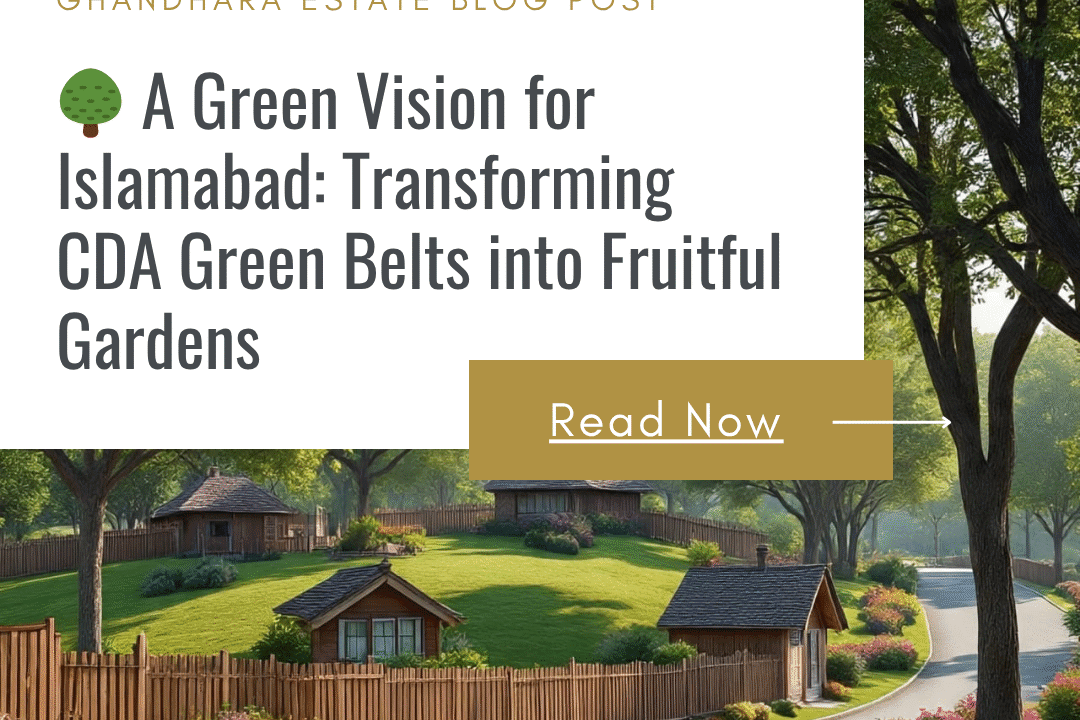

By: Waseem Khan – Resident of Islamabad
Ghandhara Estate
Islamabad — the capital city of Pakistan — stands proudly among the most beautiful and well-planned capitals in the world. Having lived here for more than two decades, I have witnessed how thoughtfully the Capital Development Authority (CDA) designed this city, surrounded by lush greenery, scenic hills, and public parks that make Islamabad a true symbol of serenity and order.
However, there is always room for improvement. One area that deserves attention is the vegetation within Islamabad’s green belts and road medians. While CDA has done an admirable job maintaining greenery, many of these areas are now filled with self-grown wild bushes and paper mulberry trees — the latter being a major cause of pollen allergy for thousands of residents every spring.
🌼 A Productive Alternative: Fruit and Flower Gardens for Islamabad
I would like to humbly suggest that CDA should gradually replace wild vegetation with fruit-bearing trees and cut-flower plantations such as:
🍊 Citrus and Orange trees
🍑 Peach and Plum trees
🍇 Grapevines
🌹 Cut Flower Roses and Ornamental Plants
This transformation would not only preserve Islamabad’s greenery but also make it more beautiful, healthy, and economically beneficial.
🌿 Benefits of the Proposed Plan
-
Natural Shade and Cooling:
Fruit trees like citrus and peach provide thick shade, making Islamabad’s roads and parks cooler during the scorching summer months. -
Enhanced Beauty:
When these trees blossom, the entire city will be filled with vibrant colors and sweet fragrances — enhancing Islamabad’s natural charm and appeal to both residents and tourists. -
Economic Opportunities:
CDA can earn annual income from fruit sales. During harvest seasons, citizens could participate in “pick-your-own” fruit activities — paying per basket — creating a family-friendly recreational experience. This initiative would promote eco-tourism, attract visitors from other cities, and even from abroad. -
Support for Local Industry:
The cut flowers (especially roses) could be sold to local florists or exported abroad, generating additional revenue for CDA and encouraging horticulture-based entrepreneurship. -
Beekeeping and Honey Production:
Fruit and flower gardens attract bees, offering CDA an opportunity to produce and sell organic honey, another sustainable income source. -
Employment and Community Involvement:
CDA’s horticultural department and local gardeners (Malis) can be involved in maintaining these plantations. Furthermore, if CDA faces resource limitations, small plots can be leased to private nurseries or interested citizens, ensuring active public participation.
🌸 Starting with a Model Project
This initiative can begin as a pilot project in a large park — such as F-9 Park or Rawal Dam Park — where CDA can develop fruit orchards, picnic spots, BBQ areas, seating zones, prayer halls, and restrooms.
Such spaces will provide healthy outdoor recreation, strengthen family bonds, and promote environmental awareness.
🌍 A Greener, Healthier Future for Islamabad
Islamabad is already known for its scenic beauty, but this initiative could elevate it to a new level — becoming a model eco-city for the entire region. A city where every green belt blossoms with fruits and flowers, where families enjoy nature together, and where sustainability meets beauty.
If implemented thoughtfully, this vision could transform Islamabad into not just a capital city, but a living garden of Pakistan — symbolizing harmony between people and nature.
